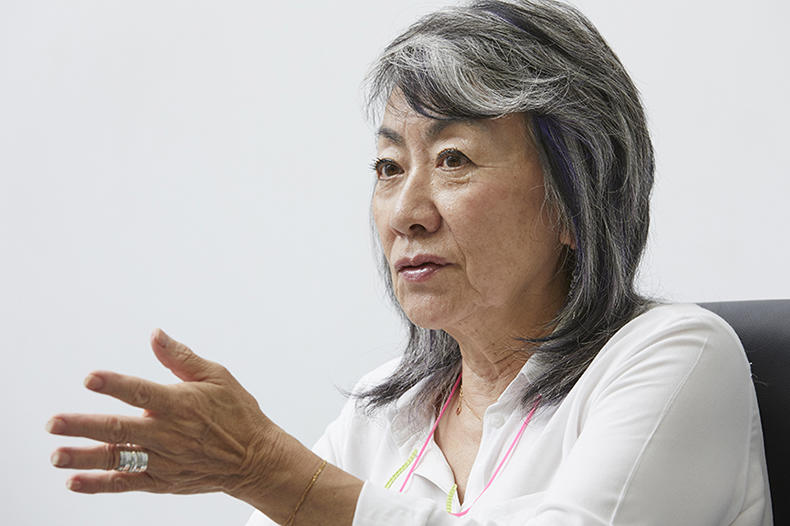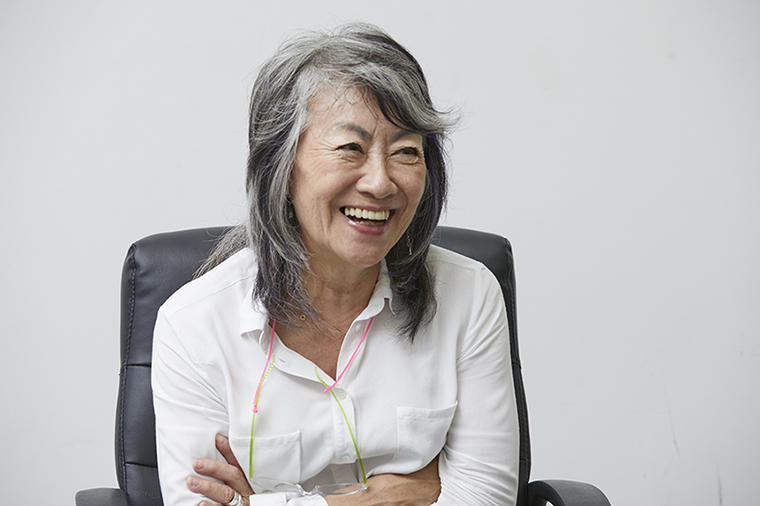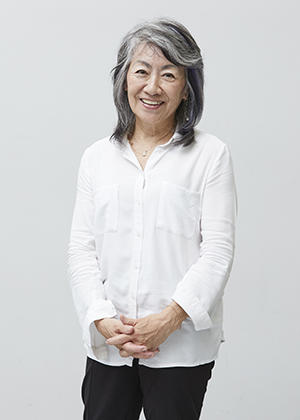Director, lyricist, Casting Director, representative of the UPS ACADEMY, which nurtures actors for the global stage
1969 B.A., Division of Languages (then), College of Liberal Arts

In search of talent that can brighten a role
As Casting Director, my most recent job was casting Naoki Kobayashi of Sandaime J Soul Brothers for a role in The Earthquake Bird, an American movie produced by Ridley Scott. When I'm entrusted with casting, I don't believe in casting just the ones everyone knows. I try to search for new talent. That was the case when I recommended Ken Watanabe for The Last Samurai. The same could be said for Rinko Kikuchi, Anne Suzuki and Suzuka Ohgo who all had their Hollywood debut. I am not just looking for someone famous, but widen my vision a bit more to search and identify someone who is really appropriate. As a result, I have been able to assist many in their work oversea.
Also, in Unbroken, directed by Angelina Jolie, I cast world famous guitarist Miyavi, and he did a brilliant performance in the film. It was his first time to work as an actor and there were of course many things that he needed to learn. Nevertheless, I think he was able to sufficiently make his presence felt by, being able to use his keen sensitivity as an expressive artist. So in this process of searching for the person suited for a role, I sometimes look for talented people who are not necessarily actors.
At the same time, you also have to give great importance to the affinity between the role and the actor. Regardless of how good a person is at expressing something, if he or she is not suited for the role, you wouldn't call that good casting. First of all, I'll read the script and the original work thoroughly to get an image of the role in my mind, and it's a real thrill in finding an actor who will suit that role perfectly, as both the role and the actor shine.

Pride of being part of movie production team
Casting is an important work in the initial stages of movie production. That is because if you can use an actor who can deliver major box office revenues the film will have a greater chance of being made. Most of the time, they come to me just after the story and size are more or less fixed, and it is very interesting to be involved from the creative stage at the beginning of a movie's production and am thankful for being to experience that. I feel then that I can be contributing to the building to the movie. Along with grasping the intentions of the director and the scriptwriter, I share ideas with other perspectives and at times I even propose casting that goes beyond the gender specifications. In America, there have been issues time regarding "white washing*," but I hope to do casting within socially acceptable norms but not with some freedom. Nowadays there is an enhanced audience awareness regarding diversity and inclusion, and movies that have stereotypical acting with respect to nationality or gender will not be accepted well.
As a producer, there are times in a production, when your views clash with the director and staff or the actor. In such cases, I make it a point to really communicate.
There are times when I notice that the Japanese seem to be working on assumptions or an established way of thinking regarding Japan. In The Winds of God, which I directed, I researched necessary information till I was fully satisfied and tried to create scenes that would overturn conventional images. It is a work that depicts the kamikaze unit during the war. It was believed that the soldiers of those days didn't use any English. However, in doing our research, we found that they were commonly learning and speaking English. Therefore, in the scene where the soldiers race, I deliberately used the dialogue "Yoi, start (ready, go)!" with English in it, which made it possible to present the historical background in a realistic manner.
In the case of the United States, film productions will often be sufficiently funded to do thorough research in its preparation. In The Last Samurai, there was a unique helmet, which the actors thought was not Japanese as they were used to the stereotyped ones but the costume designer had done her proper research of that era. . In Japan, the funding for research is limited in most cases, so I hope film producers will realize the importance of putting more funding into research.
*Casting white actors for non-white roles.

Life-changing encounters and realizations that ICU gave me
I aspired to be an actor, but my father recommended me to join ICU. It was his idea that I should nurture knowledge necessary to live in society, and would need it in my field as well. I wanted to become an actor in Japan, but since I was living in Canada for a long time, I think it turned out to be the best time for me to learn Japanese and Japanese culture. Beyond all that, I feel it was a truly wonderful choice that changed my life. There are three things that influenced me in particular.
The first thing is that I did gain a lot of interesting knowledge. For example, I wrote the lyrics for the song Gandhara sang by GODIEGO, and the idea for this lyric came from an archaeology class at ICU. I learned the word Gandhara in the class and it remained etched in my mind as I was attracted by the concept as it was the combination of East and West and a Utopia as well as the resonance of the word. When I was approached to write the lyrics, I thought there was no other word that expresses what I wanted to convey to this extent. I am so grateful that I was able to be involved in that song that is still loved by numerous people.
The second is that I found the man who I would eventually marry. We met while we were at college and got married after graduating and had two children. I often spend time together with my three grandchildren and I cannot think of a life without my children and grandchildren.
The third is that I came to realize the importance of having my own opinion. In those days, though this situation may not have changed, in a class with both Japanese and international students, most of the time it was the international students who raised their hands and ask questions. In Japan, we attach importance to harmony reflecting our culture, but I learned that it is very valuable to express your own opinion, instead of worrying about whether it may turn out to be wrong or not all that important. It was so true when I was an aspiring actor, and it still holds true living my life as a member of society.

No need to be "obsessed" with one's roots
Going overseas is an extremely great experience to learn about Japan. I have been constantly going back and forth between Japan and foreign countries from my childhood till now, and regardless of where I am, I always come across instances which make me realize the positive and negative aspects of Japan.
Some of the students at ICU may feel that they have lost touch with their roots and feel troubled by that, but I would especially like such students to be exposed to various things outside Japan. Experiences in foreign countries and languages will I feel, lessen the need to belong to something specific and you will be able to admire your own existence. Find your strong points, what makes you really you and the direction would want to take. I would very much like you to realize how wonderful it is go through that process of self discovery.
Don't compare yourself with someone else. That is because there is only one you in this world. People are interesting and life is beautiful because of the various differences. Life is amazing! I would be glad if young people could respect that of each other.
Profile
Yoko Narahashi
Director, lyricist, Casting Director, representative of the UPS ACADEMY, which nurtures actors for the global stage
1969 B.A. in Arts and Sciences (Languages)
Narahashi lived in Canada from her childhood till her high school days because of her father's job. After returning to Japan, she joined ICU's College of Liberal Arts. After graduating from ICU, Narahashi has been successful in various spheres including as a producer, lyricist, the representative of UPS ACADEMY, an actors' training school and as a casting director. She did casting for movies such as The Last Samurai, Babel and Memoirs of a Geisha.




